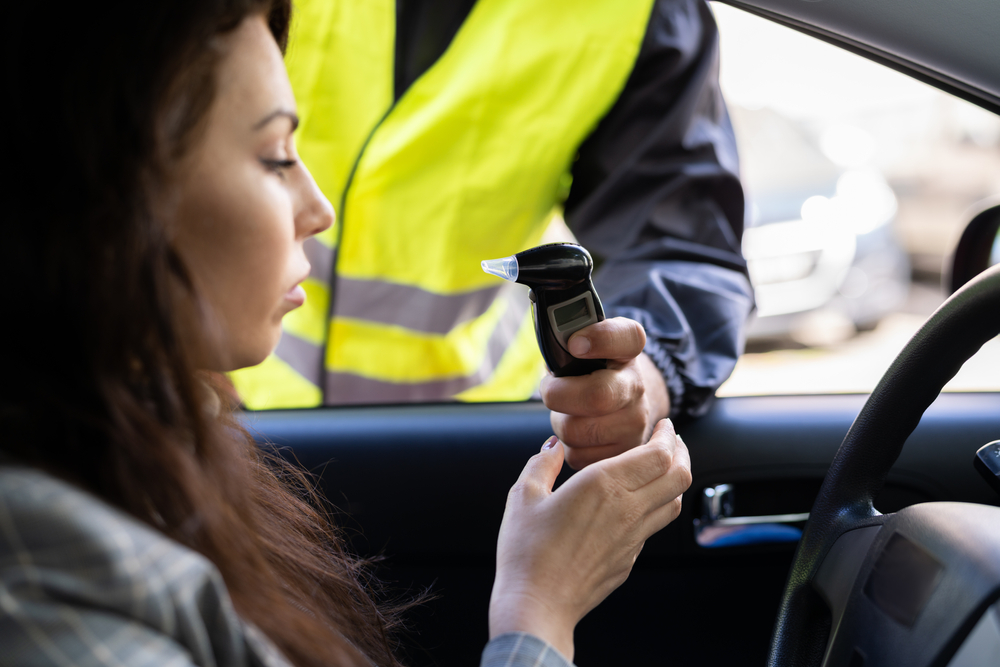Wondering how long alcohol stays in your system for a breathalyzer? A breathalyzer can find alcohol on your breath for up to 24 hours. This post will guide you through understanding the timeline and factors affecting it.
Key Takeaways
- Breathalyzers can detect alcohol in your breath for up to 24 hours after you drink.
- The amount of alcohol you drink, your metabolism rate, and whether or not you’ve eaten can change how long alcohol stays in your system.
- Blood tests can find alcohol for up to 12 hours, and urine tests can show it for up to five days after drinking.
Understanding Breathalyzer Technology
Breathalyzers work by measuring the amount of alcohol in your breath. The accuracy of these tests is influenced by various factors like the type of breathalyzer used and how it’s administered.
How Breathalyzers Work
Breathalyzers measure alcohol on a person’s breath to find out how much alcohol is in their blood. The device starts working 15 minutes after someone drinks alcohol. It uses a chemical reaction with the alcohol in the breath.
This changes color depending on how much alcohol it finds. This color change helps the machine figure out the blood alcohol content (BAC).
A person blows into the breathalyzer, and then it gives a number that shows their BAC. The test can spot alcohol for up to 24 hours after drinking. This time can change because of different things like how much someone drank or their body type.
So, knowing how long will 1 beer show up on a breathalyzer depends on these factors too.
Accuracy of Breathalyzer Tests
Breathalyzer tests can give different results for different people. This is because many factors change how alcohol shows up in our breath. For some, a breathalyzer can detect alcohol for up to 24 hours after drinking.
Yet, this time varies widely based on things like how much you drank and your body’s metabolism.
Breathalyzers work by measuring the amount of alcohol in your breath.
Tests also show that individual differences greatly impact breathalyzer accuracy. Blood and urine tests offer more exact measurements, with blood tests detecting alcohol for up to 12 hours and urine tests for up to five days after consumption.
These variations highlight why one cannot solely rely on a single reading from a breathalyzer to understand fully how long alcohol stays in their system.
Let’s move on to the factors influencing detection times.
Factors Influencing Detection Times
Factors like the amount of alcohol consumed, individual metabolism rates, and food and water intake can affect how long alcohol remains detectable by a breathalyzer. These factors contribute to varying detection times for different individuals.
Amount of Alcohol Consumed
The more alcohol you drink, the longer it stays in your system. Breathalyzers can detect alcohol for up to 24 hours. If someone drinks a lot, the device will likely find alcohol in their breath even after many hours have passed since their last drink.
This is because the body takes time to process and remove alcohol.
Every person handles alcohol differently due to factors like metabolism and overall health. Some people might show signs of alcohol on a breathalyzer test for a shorter period, while others might reach up to the full 24-hour mark before they’re clear.
Knowing this helps us understand why there’s no one-size-fits-all answer for how long a breathalyzer can detect alcohol in someone’s system.
Individual Metabolism Rates
Individual metabolism rates play a significant role in how long alcohol stays in the system for a breathalyzer. Metabolism varies from person to person, affecting how quickly their body breaks down and eliminates alcohol.
This means that someone with a faster metabolism may process alcohol more efficiently than someone with a slower metabolism, impacting the duration of detectable alcohol levels on a breathalyzer test.
The speed at which an individual’s metabolism processes alcohol can influence the detection window for a breathalyzer test. A faster metabolic rate generally results in quicker elimination of alcohol from the body, leading to shorter detection times on a breathalyzer test.
Conversely, individuals with slower metabolic rates may have prolonged detection windows due to the extended time it takes for their bodies to break down and expel alcohol.
Food and Water Intake
Eating food before drinking can slow down alcohol absorption into the bloodstream, while a full stomach may delay the detection of alcohol in the breath by a breathalyzer. Drinking water does not speed up the elimination of alcohol from the body but helps to prevent dehydration caused by drinking.
The presence of food and water in your system can affect how long alcohol stays detectable on a breathalyzer test.
Typical Detection Windows for Breathalyzers
Breathalyzers can generally detect alcohol for up to 24 hours after consumption, depending on various factors such as the amount of alcohol consumed, individual metabolism rates, and food and water intake.
The detection window can vary from person to person, with some individuals registering a positive reading several hours after their last drink while others may show no trace within the same timeframe.
General Timeline for Alcohol Detection
Understanding how alcohol moves through the body is crucial for knowing when it may be detected by a breathalyzer. The following table presents an overview of the expected duration for alcohol detection:
| Test Type | Detection Time After Drinking |
| Breathalyzer | 12-24 hours |
| Blood Test | Up to 12 hours |
| Urine Test | 12-24 hours, up to 5 days |
A breathalyzer can detect alcohol shortly after consumption, typically starting around 15 minutes afterward. Alcohol is identifiable in blood tests for roughly 6 hours. Urine tests can indicate the presence of alcohol for extended durations, sometimes up to five days. It’s worth noting that individual factors can influence the retention time of alcohol in the system. Such factors include the amount consumed and the metabolic rate of the person. The timeframe for alcohol detection in the system can be quite variable from person to person.
Conclusion
In conclusion, the time alcohol stays in your system for a breathalyzer varies. It can be detected on the breath for up to 24 hours. Factors like individual metabolism and food intake influence detection times.
Generally, alcohol can be measured in the blood for about 12 hours and in urine for up to 24 hours after consumption. The detection window varies among individuals due to several influencing factors such as quantity consumed and individual differences.
Need a faster path to regain your driving privileges after a DUI?
If you’ve been charged with a DUI in California, consider the Jackson Bibby Awareness Group. We provide both online and on-site DUI courses in key locations including Redlands, Victorville, and Barstow. Our courses are crafted to simplify your experience and minimize stress, helping you move forward with your life.
Reach out now for details on our DUI courses and how we assist you.
FAQs
1. What is a breathalyzer and how does it work?
A breathalyzer is a tool used to measure alcohol content in your system. It detects alcohol by analyzing the air you exhale.
2. How long can a breathalyzer detect alcohol in my body?
The detection period of a breathalyzer varies, but typically, it can identify alcohol for up to 24 hours after consumption.
3. Does the amount of alcohol consumed affect how long it stays detectable?
Yes, consuming more alcohol extends the timeframe during which a breathalyzer can detect its presence in your system.
4. Are there ways to speed up the removal of alcohol from my system for a breathalyzer test?
While some believe that drinking water or coffee helps eliminate alcohol faster, these methods don’t actually shorten the time that a breathalyzer can detect it.


Recent Comments